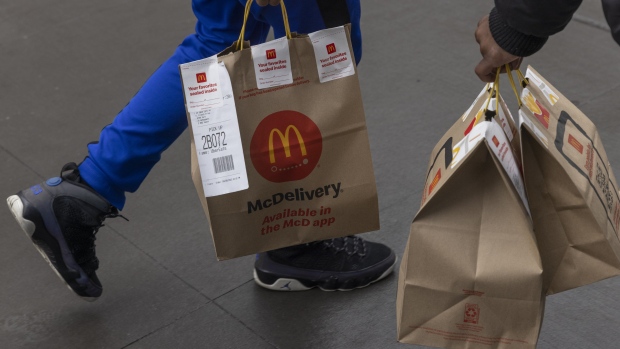Feb 5, 2024
McDonald's sales growth slows with Mideast war hurting results
, Bloomberg News

McDonald’s Corp.’s sales missed investor expectations in the fourth quarter as growth decelerated, hurt in part by the conflict in the Middle East.
Comparable sales, a key metric for the restaurant industry, rose 3.4 per cent in the period, McDonald’s said Monday. That’s the slowest since the fourth quarter of 2020, and below the average estimate of analysts polled by Bloomberg. Revenue was also shy of estimates.
Shares fell 3 per cent at 9:31 a.m. in New York.
Expectations were lowered after Chief Executive Officer Chris Kempczinski’s warning earlier this year of a “meaningful business impact” in the Middle East. The segment that includes the region, which accounts for about 10 per cent of McDonald’s revenue, fell well short of estimates. McDonald’s said that it has provided some assistance, including relief from royalties, to certain franchisees impacted by the conflict.
After the war broke out, the chain became one of the most prominent targets for boycotts in Muslim nations over its perceived stance on the conflict as well as its status as one of the most recognized American brands. The company has repeatedly said its restaurants are run independently by local operators.
Growth in other regions weakened as well. In the U.S., higher prices helped drive comparable-sales growth of 4.3 per cent, which is slightly below the average market estimate and about half of the previous quarter’s rate.
It was a similar story in international markets where McDonald’s operates and franchises restaurants. Results were strong in the U.K., Germany and Canada, but that was partly offset by a decline in same-store sales in France. Performance there took a hit from boycotts, Kempczinski said Monday on a call with analysts, citing the country’s large Muslim population.
The fourth-quarter results included pretax charges of US$138 million, which McDonald’s attributed to the write-off of software no longer in use and restructuring costs. Excluding those items, earnings per share of $2.95 were above analysts’ expectations.
2024 Outlook
In the statement, Kempczinski said the company is “confident in the resilience of our business amid macro challenges that will persist in 2024.” Executives have previously said higher interest rates and inflation are putting pressure on consumers, while also flagging China’s slowing economy.
McDonald’s expects comparable sales growth in 2024 to moderate toward more “normalized” trends, Chief Financial Officer Ian Borden said on a call with analysts. That includes rates of 3 per cent to 4 per cent for the US and international markets where McDonald’s operates and franchises restaurants. The chain expects no meaningful improvement for the segment that includes the Middle East until there’s a resolution to the war, Borden said.
The burger giant expects to add 1,600 net stores around the world this year, it said in a filing accompanying the results, as part of what it says is the biggest growth push in its history. It met its 2023 goal of opening 1,500 net restaurants, filings show.
The chain reiterated guidance that net openings will boost sales generated by franchised and company-operated stores by about 2 per cent this year, and that operating margin would rise by a percentage in the mid-to-high 40s.




